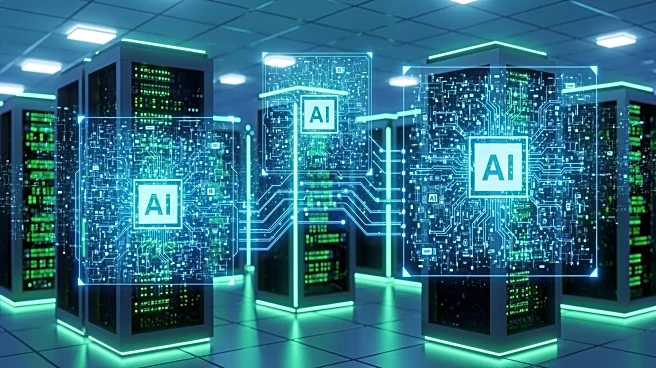What's Happening?
Communications service providers (CSPs) are increasingly adopting self-learning AI systems to manage the growing complexity of virtualized networks and hybrid infrastructures. These systems are designed to handle the vast amounts of data generated by
modern networks, allowing CSPs to move from reactive to predictive operations. Self-learning AI continuously evolves by ingesting telemetry across various domains, enabling it to detect correlations, predict potential failures, and identify effective interventions. This approach aims to reduce the dependency on rules-based systems, which often require human intervention and struggle to adapt to changes. By building an evolving understanding of network behavior, self-learning AI supports reasoning and foresight, enhancing operational efficiency and customer service.
Why It's Important?
The implementation of self-learning AI in CSP operations is crucial for improving network reliability and customer satisfaction. As networks become more complex, traditional rules-based systems are insufficient to manage the dynamic environment. Self-learning AI offers a solution by providing predictive insights and enabling rapid responses to network issues. This transition is expected to reduce downtime, enhance service quality, and build trust in AI-driven decisions. CSPs that successfully integrate these systems can achieve more resilient and adaptive operations, positioning themselves as leaders in the industry. The shift towards predictive operations is not only an efficiency play but also a strategic move to meet the growing demands of customers and maintain competitive advantage.
What's Next?
CSPs are likely to continue investing in self-learning AI technologies to further enhance their network operations. As these systems evolve, they will increasingly handle repetitive or well-understood incidents autonomously, while complex cases may still require human oversight. The goal is to achieve fully autonomous operations where networks self-monitor, self-adjust, and self-optimize in real-time. This progression will accelerate response times, reduce operational costs, and improve service reliability. Stakeholders, including network engineers and IT professionals, will need to adapt to these changes by focusing on strategic planning and innovation rather than routine troubleshooting.
Beyond the Headlines
The adoption of self-learning AI in CSP operations raises important ethical and governance considerations. Ensuring transparency in AI decision-making processes and maintaining human oversight are critical to building trust in these systems. Structured feedback loops and compliance with operational priorities are necessary to align AI learning with business objectives. As AI becomes more integrated into network operations, CSPs must address potential biases and ensure equitable service delivery. The long-term impact of these technologies may also influence regulatory frameworks and industry standards, shaping the future of telecommunications.















